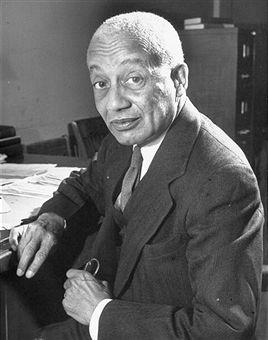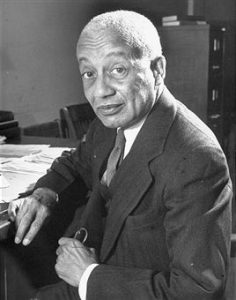
This week’s open threads will highlight the work of African-American philosophers and their work within Africana philosophy. Here’s a little background on the concept of Africana philosophy:
Africana philosophy is the work of philosophers of African descent and others whose work deals with the subject matter of the African diaspora.
Africana philosophy includes the philosophical ideas, arguments and theories of particular concern to people of African descent. Some of the topics explored by Africana philosophy include pre-Socratic African philosophy and modern-day debates discussing the early history of Western philosophy, post-colonial writing in Africa and the Americas, black resistance to oppression, black existentialism in the United States, and the meaning of “blackness” in the modern world.
Lucius Outlaw writes:
“Africana philosophy” is very much a heuristic notion—that is, one that suggests orientations for philosophical endeavors by professional philosophers and other intellectuals devoted to matters pertinent to African and African-descended persons and peoples.
Professional philosophers in the areas of ethics, social philosophy, political philosophy, philosophy of biology, semantics, critical race theory, and post-colonialism are currently exploring Africana philosophy. The American Philosophical Association has 10,000 members in North America. It is estimated that only 100 of its members in North America are of African descent.
Lewis Gordon writes:
Africana philosophy is a species of Africana thought, which involves the theoretical questions raised by critical engagements with ideas in Africana cultures and their hybrid, mixed, or creolized forms worldwide. Since there was no reason for the people of the African continent to have considered themselves African until that identity was imposed upon them through conquest and colonization in the modern era… this area of thought also refers to the unique set of questions raised by the emergence of “Africans” and their diaspora here designated by the term “Africana”… Africana philosophy refers to the philosophical dimensions of this area of thought.
Branches include African philosophy, black existentialism, double consciousness, black theology, and womanism.
Alain LeRoy Locke (September 13, 1885 – June 9, 1954) was an American writer, philosopher, educator, and patron of the arts. Distinguished as the first African-American Rhodes Scholar in 1907, Locke was the philosophical architect —the acknowledged “Dean”— of the Harlem Renaissance. As a result, popular listings of influential African Americans have repeatedly included him. On March 19, 1968, the Rev. Dr. Martin Luther King, Jr. proclaimed: “We’re going to let our children know that the only philosophers that lived were not Plato and Aristotle, but W. E. B. Du Bois and Alain Locke came through the universe.”
Alain Locke was born in Philadelphia, Pennsylvania, on September 13, 1885 to Pliny Ishmael Locke (1850–1892) and Mary Hawkins Locke (1853–1922). He was the only child of a well-to-do family with significant pedigree. His mother Mary, who was a teacher, incited in him his passion for education and literature. In 1902, he graduated from Central High School in Philadelphia, second in his class. He also attended Philadelphia School of Pedagogy.
In 1907, Locke graduated from Harvard University with degrees in English and philosophy, and was honored as a member of the Phi Beta Kappa Society and recipient of the prestigious Bowdoin prize. After graduation, he was the first African-American selected as a Rhodes Scholar (and the last to be selected until 1960). At that time, Rhodes selectors did not meet candidates in person, but there is evidence that at least some selectors knew he was African-American. On arriving at Oxford, Locke was denied admission to several colleges, and several Rhodes Scholars from the American South refused to live in the same college or attend events with Locke. He was finally admitted to Hertford College, where he studied literature, philosophy, Greek, and Latin, from 1907–1910. In 1910, he attended the University of Berlin, where he studied philosophy.
Locke wrote from Oxford in 1910 that the “primary aim and obligation” of a Rhodes Scholar “is to acquire at Oxford and abroad generally a liberal education, and to continue subsequently the Rhodes mission [of international understanding] throughout life and in his own country. If once more it should prove impossible for nations to understand one another as nations, then, as Goethe said, they must learn to tolerate each other as individuals”.
Locke received an assistant professorship in English at Howard University in 1912. While at Howard, he became a member of Phi Beta Sigma fraternity. Locke returned to Harvard in 1916 to work on his doctoral dissertation, The Problem of Classification in the Theory of Value. In his thesis, he discusses the causes of opinions and social biases, and that these are not objectively true or false, and therefore not universal. Locke received his PhD in philosophy in 1918.

